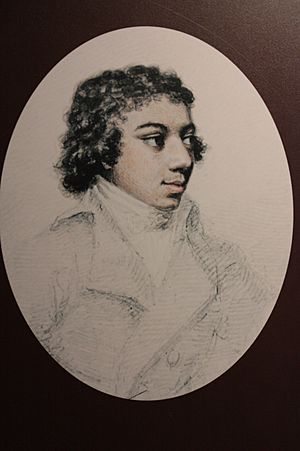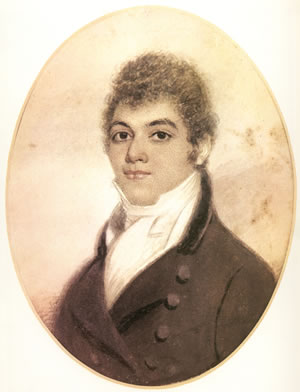George Bridgetower facts for kids

George Augustus Polgreen Bridgetower (born October 11, 1778 – died February 29, 1860) was a talented British musician. He was a virtuoso violin player who lived in England for most of his life. His amazing playing impressed the famous composer Ludwig van Beethoven. Beethoven even planned to dedicate his famous Kreutzer Sonata to Bridgetower after they played it together for the first time.
Contents
Early Life and Music Career
George Augustus Polgreen Bridgetower was born on October 11, 1778, in Biała Podlaska, Poland. His father, John Frederick Bridgetower, was likely from the West Indies. He sometimes said he was an African prince. George's mother, Maria Anna Ursula Schmidt, was from Swabia, which is now part of Germany.
George moved to London when he was very young. By the age of 10, he was already playing the violin by himself at the Drury Lane Theatre. He showed great musical skill as a child. He gave successful violin concerts in big cities like Paris, London, Bath, and Bristol in 1789.
In 1791, the British prince regent, who later became King George IV, became interested in George. The Prince helped with George's music education. George studied with important teachers like François-Hippolyte Barthélémon and Thomas Attwood. Between 1789 and 1799, Bridgetower performed in about 50 concerts in London. He also played in the Prince's own orchestra.
Bridgetower and Beethoven
In 1802, George Bridgetower visited his mother and brother, Friedrich Joseph Bridgetower, in Dresden. His brother was a cellist. George also gave concerts there. In 1803, he visited Vienna and played music with Ludwig van Beethoven.
Beethoven was very impressed with Bridgetower's talent. He decided to dedicate his Violin Sonata No. 9 to Bridgetower. Beethoven even wrote a playful dedication that called Bridgetower a "mixed-race madman and mixed-race composer."
The piece was played for the first time on May 24, 1803. Beethoven played the piano, and Bridgetower played the violin. Bridgetower had to read the music for the second part of the song right from Beethoven's own copy! During the performance, Bridgetower made a small change to his part. Beethoven liked it so much that he jumped up and said, "Once more, my dear fellow!" Beethoven even gave Bridgetower his own tuning fork.
However, the two musicians had a disagreement soon after. Bridgetower reportedly insulted a woman who was Beethoven's friend. Because of this, Beethoven stopped being friends with Bridgetower. He also changed the dedication of the violin sonata. He dedicated it instead to another violinist named Rudolphe Kreutzer. Kreutzer never actually played the piece, saying it was too hard. Today, the piece is known as the Kreutzer Sonata.
Later Life in England
After his time with Beethoven, Bridgetower went back to England. He continued his music career by teaching and performing. He became a member of the Royal Society of Musicians in 1807. He also studied at Trinity Hall, Cambridge and earned a degree in music in 1811.
In 1813, he performed in the first season of the Philharmonic Society in London. He married Mary Leech Leeke in 1816. Later in his life, he traveled to places like Italy, where his daughter lived.
George Bridgetower passed away in 1860 in Peckham, south London. He is buried in Kensal Green Cemetery.
His Own Music
Bridgetower also wrote his own music. Some of his known compositions include Diatonica armonica for piano and Henry: A ballad for voice and piano. Sadly, many of his works have been lost over time.
Legacy and Remembrance
George Bridgetower's story has been told in different ways:
- He appears as a character in the 1994 film Immortal Beloved.
- In the 1996 British film A Mulatto Song, actors played Bridgetower as a child and an adult.
- A book called Sonata Mulattica was written about him by Rita Dove in 2009.
- A novel called La Sonate à Bridgetower (The Bridgetower Sonata) was written by Emmanual Dongala in 2017.
- A short animated film called Bridgetower was also made.
- A jazz opera called Bridgetower - A Fable of 1807 was created in 2007. It celebrated 200 years since the law that helped end slavery in Britain.
Some people now believe that Beethoven and Bridgetower might not have had a big fight. A BBC Radio 3 documentary in 2021 explored this idea. It suggested that Beethoven might have just dedicated the printed music to someone else, even if he was still friends with Bridgetower.
See also
 In Spanish: George Bridgetower para niños
In Spanish: George Bridgetower para niños
 | James Van Der Zee |
 | Alma Thomas |
 | Ellis Wilson |
 | Margaret Taylor-Burroughs |


